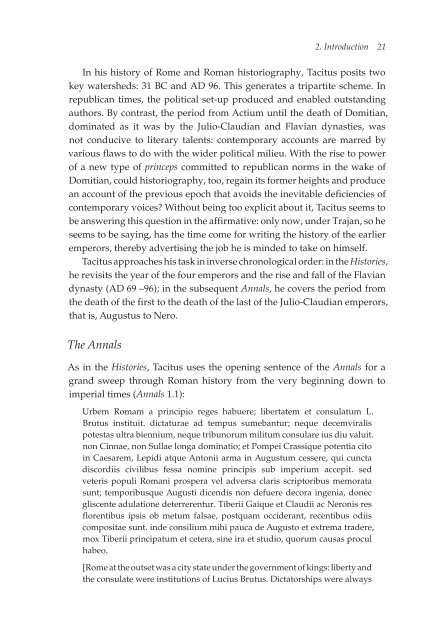Tacitus, Annals, 15.20-23, 33-45. Latin Text, Study Aids with Vocabulary, and Commentary, 2013a
Tacitus, Annals, 15.20-23, 33-45. Latin Text, Study Aids with Vocabulary, and Commentary, 2013a
Tacitus, Annals, 15.20-23, 33-45. Latin Text, Study Aids with Vocabulary, and Commentary, 2013a
Create successful ePaper yourself
Turn your PDF publications into a flip-book with our unique Google optimized e-Paper software.
In his history of Rome <strong>and</strong> Roman historiography, <strong>Tacitus</strong> posits two<br />
key watersheds: 31 BC <strong>and</strong> AD 96. This generates a tripartite scheme. In<br />
republican times, the political set-up produced <strong>and</strong> enabled outst<strong>and</strong>ing<br />
authors. By contrast, the period from Actium until the death of Domitian,<br />
dominated as it was by the Julio-Claudian <strong>and</strong> Flavian dynasties, was<br />
not conducive to literary talents: contemporary accounts are marred by<br />
various flaws to do <strong>with</strong> the wider political milieu. With the rise to power<br />
of a new type of princeps committed to republican norms in the wake of<br />
Domitian, could historiography, too, regain its former heights <strong>and</strong> produce<br />
an account of the previous epoch that avoids the inevitable deficiencies of<br />
contemporary voices? Without being too explicit about it, <strong>Tacitus</strong> seems to<br />
be answering this question in the affirmative: only now, under Trajan, so he<br />
seems to be saying, has the time come for writing the history of the earlier<br />
emperors, thereby advertising the job he is minded to take on himself.<br />
<strong>Tacitus</strong> approaches his task in inverse chronological order: in the Histories,<br />
he revisits the year of the four emperors <strong>and</strong> the rise <strong>and</strong> fall of the Flavian<br />
dynasty (AD 69 –96); in the subsequent <strong>Annals</strong>, he covers the period from<br />
the death of the first to the death of the last of the Julio-Claudian emperors,<br />
that is, Augustus to Nero.<br />
The <strong>Annals</strong><br />
As in the Histories, <strong>Tacitus</strong> uses the opening sentence of the <strong>Annals</strong> for a<br />
gr<strong>and</strong> sweep through Roman history from the very beginning down to<br />
imperial times (<strong>Annals</strong> 1.1):<br />
Urbem Romam a principio reges habuere; libertatem et consulatum L.<br />
Brutus instituit. dictaturae ad tempus sumebantur; neque decemviralis<br />
potestas ultra biennium, neque tribunorum militum consulare ius diu valuit.<br />
non Cinnae, non Sullae longa dominatio; et Pompei Crassique potentia cito<br />
in Caesarem, Lepidi atque Antonii arma in Augustum cessere, qui cuncta<br />
discordiis civilibus fessa nomine principis sub imperium accepit. sed<br />
veteris populi Romani prospera vel adversa claris scriptoribus memorata<br />
sunt; temporibusque Augusti dicendis non defuere decora ingenia, donec<br />
gliscente adulatione deterrerentur. Tiberii Gaique et Claudii ac Neronis res<br />
florentibus ipsis ob metum falsae, postquam occiderant, recentibus odiis<br />
compositae sunt. inde consilium mihi pauca de Augusto et extrema tradere,<br />
mox Tiberii principatum et cetera, sine ira et studio, quorum causas procul<br />
habeo.<br />
[Rome at the outset was a city state under the government of kings: liberty <strong>and</strong><br />
the consulate were institutions of Lucius Brutus. Dictatorships were always


















